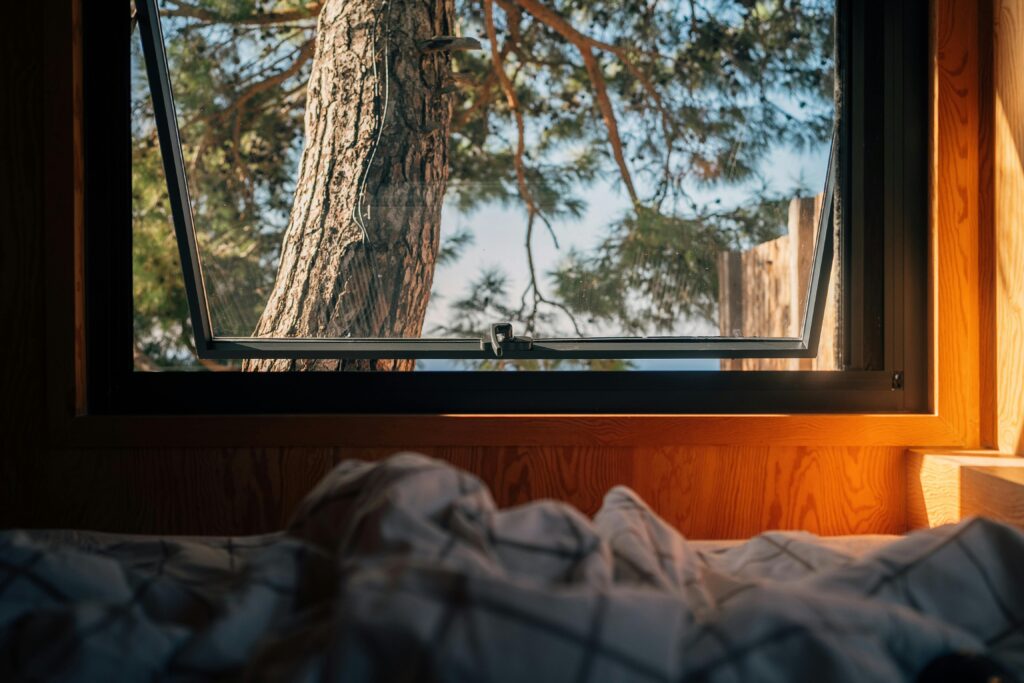The Ultimate Sleep Hygiene Guide: How to Wake Up Refreshed Every Morning
Do you wake up groggy even after a full night’s rest? You’re not alone. Millions of people struggle with poor sleep quality, tossing and turning through the night, only to face their mornings feeling exhausted. The problem often isn’t how long you sleep—it’s how well you practice sleep hygiene. True rest depends on sleep hygiene—the science and habits of healthy sleep that transform your nights from restless to restorative. When you master these simple, natural practices, you unlock the real benefits of sleeping: sharper mental clarity, stronger immunity, and a body that actually repairs itself while you rest.
In this guide, you’ll discover how to improve sleep quality naturally through time-tested principles that work with your body’s natural rhythms. I’ll show you the simple ways to strengthen sleep and recovery, and help you rediscover what truly restorative rest feels like.
What Is Sleep Hygiene and Why It Matters
Sleep hygiene refers to the collection of habits, environmental factors, and practices that promote consistent, quality sleep. Think of it as creating the perfect conditions for your body and mind to enter deep, restorative rest naturally. Poor sleep habits affect every aspect of your life. When you neglect sleep hygiene, you’re essentially forcing your body to operate on depleted resources. Your productivity plummets, your emotional balance wavers, and your physical health deteriorates over time.
The benefits of sleeping well extend far beyond feeling rested:
1. For Mental Clarity
Robust sleep hygiene facilitates critical cognitive processes, including memory consolidation and the removal of metabolic waste from the brain. This nightly maintenance is fundamental for achieving optimal mental clarity, focus, and information processing during waking hours.
2. For Immune Strength
Deep, restorative sleep directly strengthens the immune system by modulating the production and release of key defense cells, such as T-cells and cytokines. Therefore, consistent sleep optimization is a non-pharmacological strategy for enhancing the body’s innate ability to combat infection and illness.
3. For Hormonal Balance
The circadian rhythm relies on stable sleep patterns to precisely regulate endocrine functions, including the secretion of cortisol and growth hormone. Adherence to healthy sleep practices is thus essential for maintaining metabolic equilibrium, stress response, and overall hormonal health.
4. For Emotional Resilience
Quality sleep is instrumental in emotional regulation, as it allows the prefrontal cortex to effectively modulate the amygdala’s reactivity. Consequently, one of the primary benefits of sleeping well is increased emotional stability and a greater capacity to manage stress and anxiety.
5. For Physical Recovery
The most intensive physical restoration, including muscle repair, protein synthesis, and energy replenishment, occurs during deep sleep stages. This establishes a direct and causal link between superior sleep hygiene and accelerated physical recovery.
The Science Behind Sleep Hygiene
Research shows that consistent sleep patterns and a clean environment dramatically enhance sleep and recovery. Your body thrives on predictability—when you maintain regular sleep schedules, your circadian rhythm synchronizes with your lifestyle, making it easier to fall asleep and wake naturally.
Think of it this way: just as clean air refreshes your lungs, clean sleep hygiene practices refresh your mind. Studies on sleep quality and health outcomes confirm that environmental factors significantly impact how well you rest and recover each night. Environmental factors like light and noise actively disrupt the brain’s sleep-wake cycle, preventing deep, restorative stages of sleep. For instance, exposure to artificial light at night suppresses melatonin production, while noise pollution triggers micro-awakenings that fragment sleep architecture. By consciously managing these factors, you directly enable your body to achieve the continuous, high-quality sleep necessary for effective recovery.
The Airflow Factor — Nature’s Forgotten Sleep Aid
Here’s something most people overlook: fresh air might be the simplest, most powerful sleep enhancer you’re not using. For generations, people feared “night air” as dangerous or unhealthy. This myth has cost countless individuals the restorative sleep they desperately need.
The truth? Fresh air during sleep transforms your rest quality. When you sleep with proper ventilation, you’re giving your body oxygen-rich air that supports cellular repair and brain function throughout the night. The slightly cool, fresh atmosphere also helps maintain the optimal body temperature for deep sleep.
Many people seeking better health travel south for warmer climates, hoping the outdoor air will improve their wellbeing. But here’s what they miss: you can achieve the same benefits—or better—by simply sleeping with a window open in your own home. The bracing atmosphere of cooler climates can actually be more tonic and favorable to restoration than warm, relaxing southern air.
How to Sleep with Fresh Air Year-Round
Making fresh air part of your sleep hygiene doesn’t require drastic changes. Start with these practical adjustments:
Winter months: Crack your window open just one to two inches. The slight airflow provides freshness without creating a oversurplus. Adjust your bedding warmth accordingly—add an extra blanket if needed.
Summer months: Open windows wider to create cross-ventilation. Position fans to draw fresh air through your bedroom without blowing directly on you.
Year-round practice: Breathe through your nose while sleeping. Nasal breathing offers numerous health benefits including warming and filtering the air before it reaches your lungs, protecting you from any temperature concerns.
If you’re concerned about outdoor air quality, remember that indoor air often contains more pollutants than outdoor air. For additional lifestyle tips that complement better rest, explore our comprehensive guide on fresh air benefits.

Listen to Your Body — Personalized Sleep and Recovery
Your sleep needs aren’t identical to everyone else’s. Sleep and recovery function as your body’s natural repair mode, and the time required varies based on your age, stress levels, physical activity, and current health status.
Many physicians and sleep experts debate the ideal sleep duration, but here’s what matters most: your individual needs. In robust health and adult life, seven to eight hours typically suffice. Children and those recovering from illness require more. Since most people deal with some level of health stress, the safest approach encourages sleeping as much as your body naturally desires.
The 7–9 Hour Myth Explained
We’ve all heard the standard recommendation: adults need exactly eight hours of sleep. But this oversimplifies how sleep and recovery actually work. A 2015 study published in Sleep Health analyzing nearly 1.5 million adults found that while 7-9 hours is the general range for optimal health, individual needs are highly variable and influenced by genetics, activity level, and overall health. Adults in vigorous health often thrive on seven hours. Active children might need ten to twelve hours due to the high sleep demand for neural development and physical growth.
Sticking to a regular bedtime and wake-up time, even on weekends, helps your body get into a steady rhythm. Sleeping in a dark and quiet room supports this process. When you do this, your body learns to manage your sleep cycles effectively, allowing you to wake up feeling refreshed on your own when you have had enough rest.
Rest Without Guilt — When More Sleep Means Healing
Ever notice how you sleep longer after a stressful week or during illness? This isn’t laziness—it’s healing. When your system experiences abuse, illness, or unusual stress, sleep becomes the necessary condition for restoration.
Someone recovering from a particularly demanding period might sleep ten to twelve hours at a stretch. Those fighting fever often sleep more than half the day. Research on sleep’s role in immune function and recovery confirms this: extended sleep represents your body’s intelligent response to restoration needs, not a problem to fix.
Many people mistake this natural response for a cause of weakness rather than recognizing it as nature’s healing mechanism. If you find yourself needing more sleep than usual, honor that signal. When you discover and address the underlying cause—whether stress, poor nutrition, or illness—your sleep will naturally normalize.
How Good Sleep Hygiene Slows Brain Aging and Protects Mental Vitality
Recent scientific findings add a fascinating layer to what we already know about sleep hygiene—it may literally keep your brain young. A large-scale UK study analyzing MRI scans and sleep data from over 27,000 adults aged 40 to 70 discovered a strong link between poor sleep habits and accelerated brain aging. Researchers used advanced imaging and machine learning to compare healthy sleepers with those experiencing irregular patterns such as insomnia, snoring, or excessive sleep. The results were striking: participants with poor sleep hygiene showed brain changes equivalent to nearly one extra year of aging.

This subtle but measurable acceleration in brain aging increases long-term risks for cognitive decline, memory loss, and even dementia. The encouraging news? These effects are largely reversible. By practicing consistent sleep hygiene habits—like maintaining regular sleep hours, minimizing screen exposure before bed, and keeping your room dark and quiet—you can slow or even prevent this decline.
The takeaway is clear: your nightly routine does more than refresh your body—it rejuvenates your mind. Quality sleep hygiene acts as natural brain protection, preserving mental sharpness and vitality as you age.
The Last Meal Rule
Timing your final meal dramatically impacts sleep quality. An overloaded stomach creates a great strain on your digestive and nervous system—it’s like asking your body to run a marathon while trying to rest.
For optimal sleep and recovery, eat your last meal three to four hours before bed. This timing allows digestion to complete, leaving your vital organs in a condition of rest when you sleep. Your body can then focus its energy on repair and restoration rather than processing food.
Important exception: If you’ve been insufficiently nourished throughout the day, a light meal before bed beats the strain of inadequate nutrition. Listen to your body. Sometimes meeting your nutritional needs outweighs the ideal timing rule. For guidance on supporting your digestive system naturally, consider how your eating patterns affect your overall wellbeing.
Create a Calming Sleep Environment
Your bedroom environment directly influences how to improve sleep quality naturally. Transform your space with these elements:
Lighting: Dim lights signal your brain to produce melatonin. Use warm-toned bulbs in the evening and eliminate blue light from screens at least one hour before bed.
Noise: Reduce interruptions with white noise machines or earplugs if needed. Silence isn’t always necessary—consistent, gentle sounds often aid sleep better than complete quiet.
Routine: Establish a 20-30 minute wind-down practice. Read something calming, practice deep breathing, or do gentle stretches. These activities train your body to recognize bedtime.
Temperature: Keep your room slightly cool (60-67°F). Your body temperature naturally drops during sleep, and a cooler environment supports this process.

Natural Hygienic Aids That Support Restorative Sleep
Supporting sleep hygiene goes beyond bedtime routines—it encompasses your entire sleep environment and the natural aids you choose. When you combine good habits with simple, natural supports, you create optimal conditions for the benefits of sleeping to manifest fully.
Herbal support: Chamomile, valerian root, and lemon balm gently encourage relaxation without the side effects of pharmaceutical sleep aids. These herbs work by modulating the GABAergic system—the same neurological pathway targeted by many prescription sleep aids—to promote calm. These herbs work with your body’s natural chemistry rather than forcing sedation.
Room hygiene: Clean bedding, dust-free air, and uncluttered surroundings create a sanctuary for rest. Your bedroom should feel like a retreat, not an extension of your busy day. Wash sheets weekly, vacuum regularly, and keep surfaces clear.
Physical comfort: Invest in a supportive mattress and pillows that maintain proper spinal alignment. Poor sleep posture creates tension that interrupts rest cycles. If morning stiffness plagues you, consider gentle joint mobility exercises as part of your morning routine to counteract any nighttime tension.
Simple Hygienic Sleep Checklist
Ready to transform your sleep hygiene? Start with this practical checklist:
- Open windows for 10 minutes daily to refresh your bedroom air, even in winter
- Keep a consistent bedtime within a 30-minute window, even on weekends
- Avoid screens an hour before bed to allow natural melatonin production
- Practice nasal breathing during sleep to warm and filter air naturally
- Maintain a clean, calm space free from clutter and distractions
- Adjust room temperature to slightly cool for optimal rest
- Remove artificial light sources including LED clocks and standby lights
Building Your Nightly Routine for Long-Term Benefits
Sustainable change happens gradually. Rather than overhauling your entire evening at once, build your sleep hygiene practices systematically. Here’s a sample timeline you can adapt:
7:00 PM: Finish your last substantial meal, allowing three to four hours before bed
8:30 PM: Begin your wind-down routine—dim lights, turn off work notifications, engage in relaxing activities
9:15 PM: Open your bedroom window for fresh air circulation
9:30 PM: Personal care routine—this consistency signals your body that sleep approaches
10:00 PM: Lights out, window cracked open, comfortable temperature set
Start small. Choose just one new habit this week. Maybe it’s opening your window an inch each night. Next week, add consistent bedtime. The following week, eliminate evening screen time. Sleep hygiene builds cumulatively, not instantly. Each small improvement compounds over time.
Some people thrive on four to six hours of sleep while maintaining vigorous health. Others need nine or ten hours. There’s no single perfect formula—your body’s signals guide you. When you honor those signals and provide optimal conditions through good sleep hygiene, you’ll naturally find your ideal rhythm.
Conclusion — Sleep Is the Body’s Reset Button
Let’s bring this together. Quality rest depends on three fundamental principles: fresh air circulation, personalized sleep duration, and consistent nightly rituals. These elements of sleep hygiene work synergistically to deliver the full benefits of sleeping—mental clarity, physical recovery, and emotional balance.
Fresh air transforms sleep quality in ways most people never experience because they’ve never tried it. Your body needs the oxygen-rich environment that proper ventilation provides. Open that window tonight, even just a crack. Honor your individual sleep needs without guilt. When you need more rest, that’s your body communicating its recovery requirements. Listen to that wisdom rather than forcing yourself to meet arbitrary standards.
Finally, establish your pre-sleep ritual with intention. The habits you build in those evening hours determine how well you rest through the night and how energized you feel each morning. Sleep isn’t a luxury—it’s your body’s primary maintenance program. When you invest in quality sleep hygiene, you’re investing in every aspect of your health and performance.
Start your journey toward cleaner, deeper sleep tonight. Which of these sleep hygiene habits will you try first? Share your experience in the comments or explore more natural lifestyle insights at Pathway to a Healthy Lifestyle.
